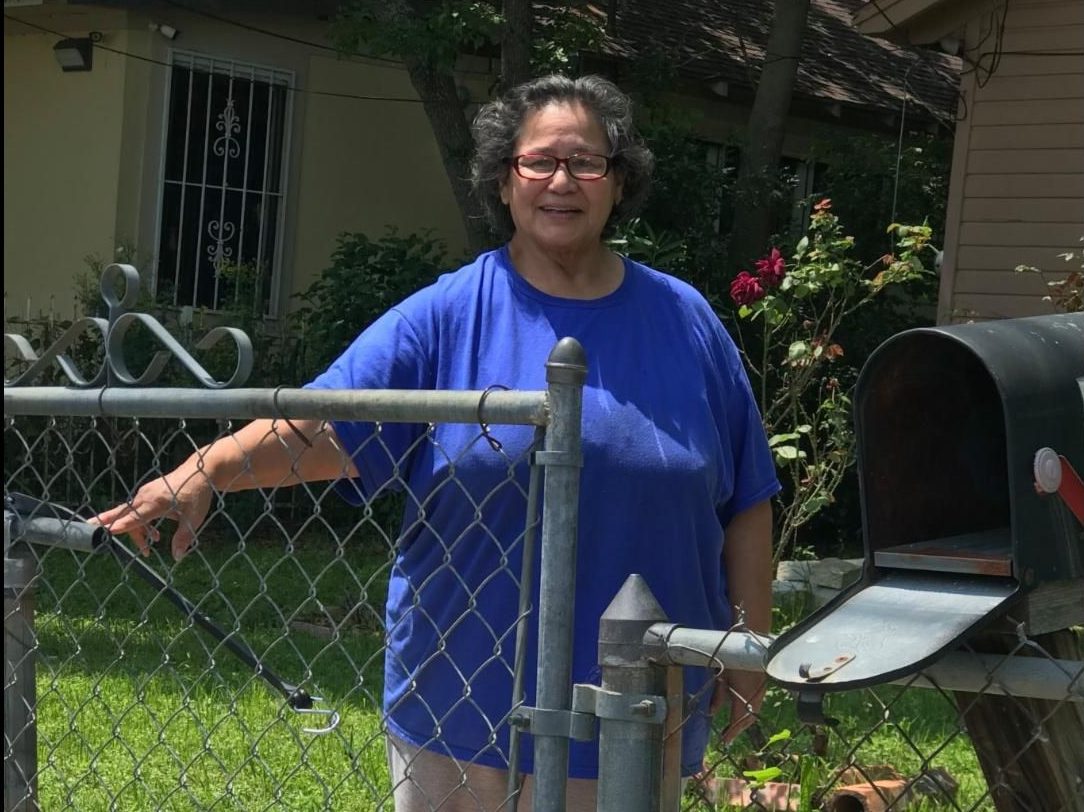Sylvia Deleon would arrive at the Wesley-Rankin Community Center in West Dallas at 8 a.m. each weekday, eager to see her friends and begin the morning’s activities.
Awaiting Deleon and others at the door would be senior program coordinator Elizabeth Alfaro, ready to greet all 74 Casa Feliz participants with a hug. After breakfast, the seniors would participate in whatever activities the center’s staff had planned for the day — bingo, crafts, exercises, memory games. They sat at tables with their closest friends, but they still interacted with the entire group.
“We basically get along with everybody,” Deleon says.

The seniors would finish lunch around noon and head home from Wesley-Rankin.
Then COVID-19 emerged and, with it, orders from local government officials to stay at home. For West Dallas seniors accustomed to eating and interacting with each other every day, the pandemic stranded them at home, often alone, and in many cases with only a flip phone to connect to the outside world.
The Casa Feliz staff of Wesley-Rankin, however, were determined to forge a new path amid the disease.
Unable to prepare meals for the seniors, Wesley-Rankin was left with the question of how to make sure they had food. The answer came in partnerships with local churches and with West Dallas nonprofit Brother Bill’s Helping Hand, who donate groceries that volunteers deliver to the seniors once a week, says Shellie Ross, Wesley-Rankin’s executive director.
Several of the seniors sewed masks for the volunteers as a thank you.
Finding a way to keep the seniors engaged with each other and with the staff has been more difficult, but just as important.
“I’ll say for most of our seniors, they live alone, which is sometimes surprising to people,” Ross says. “So it really was a strong place for them to not only promote physical health and nutrition, but also a place for them to really see their friends.”
Deleon has a personal history with Wesley-Rankin; her mother worked there and then began participating in the Casa Feliz program once she retired. After Deleon’s mother died, she followed in her mother’s footsteps, traveling to the center regularly to be part of the program.
The Casa Feliz staff worked to transition to a virtual meeting system, though this has not come easily for everyone. Ross classifies the seniors — whose ages range from 65 to 97 years — into three skill levels: those who learned how to navigate their devices quickly, those who had the devices but not the knowledge of how to operate them, and those who had flip phones, lacking both modern technology and the understanding of it.
At first, the seniors used Facebook Messenger to communicate with each other, but they soon switched to Zoom, which allowed them to include more people in the meetings and see everyone’s faces, a feature Alfaro says the seniors prefer. To teach the seniors how to use Zoom, staff at the community center went to the seniors’ houses, sent fliers with tutorials and recorded videos.
One senior even joins the Zoom gatherings by passing her phone over a fence so a kind backyard neighbor can help her log in.
“It’s been a lot of hard work,” Alfaro says. “But it was all worth it. I mean, they’re happy, they’re playing again.”
For Deleon, learning how to use Zoom — an accomplishment that surprised her children — was crucial to staying connected with the other seniors.
“Well, yeah, you know, it’s either that or not see my friends anymore,” she says.
On Zoom calls, seniors exercise together, play bingo and memory games, and enjoy sing-alongs, Alfaro said. Staff members deliver materials such as art supplies, which are used in the activities, with their groceries every week, Ross says.
Recently, they had 28 seniors playing Zoom bingo, their highest number since the pandemic began.
The community center wants all Casa Feliz seniors to participate, even those who are unable to join the Zoom meetings, so they give them instruction sheets they can use to do the activities on their own. These guides are made with pictures so seniors who can’t read can understand them.
In addition, the staff at Wesley-Rankin call the seniors at least once a week to stay in touch with them.
“Our staff could call them every single day, and they’re still lonely,” Ross says.
Some of the seniors have mental health issues such as depression, so the calls help keep them connected and enable staff to share information about resources, Alfaro says.
Casa Feliz provides purpose and a support system for the seniors that virtual interaction can’t quite replace. They are struggling with the isolation that accompanies stay-at-home orders, and so are the Wesley-Rankin staff.
Alfaro says hugging the seniors and showing them affection was something she enjoyed about Casa Feliz. Working with seniors is similar to taking care of children in that it requires a significant amount of energy, she says.
“But it was the same energy that would get me back up the next day,” Alfaro says. “And not being able to see them, it was emotional. It was an emotional struggle for me.”
As summer approaches, Ross says she is planning a virtual summer camp for the seniors, and she hopes students from the Hockaday School will be involved. These students, who visited Wesley-Rankin before COVID-19 to practice their Spanish, are already familiar with the seniors.
Though both the seniors and staff are making the most of the situation, nothing can replace the in-person gatherings at Wesley-Rankin.
“I think I miss my friends more than anything else,” Deleon says.

Excellent article, so well written. It sounds like such an awesome program for seniors. I wish we had something like that here!
This article clearly depicts the struggles that many of our elders are experiencing. Thank goodness there are people such as Alfaro and outreach programs such as Casa Feliz who push the barriers, doing whatever they have to do to assure our elders are loved and nurtured.
WhT a wonderful article and describes the senior program and the senior director to a T.